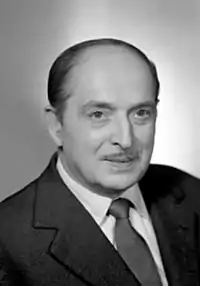Alberto Cianca | |
|---|---|
 | |
| Minister without portfolio | |
| In office 10 December 1945 – 19 February 1946 | |
| Prime Minister | Alcide De Gasperi |
| Succeeded by | Emilio Lussu |
| Personal details | |
| Born | 1 January 1884 Rome, Kingdom of Italy |
| Died | 8 January 1966 (aged 82) Rome, Italy |
| Political party |
|
Alberto Cianca (1884–1966) was an Italian journalist and anti-fascist politician. He edited several significant publications, including Il Mondo, and served in the Parliament and Senate.
Early life and education
Cianca was born in Rome on 1 January 1884.[1][2] He had a bachelor's degree in law.[3]
Career
Cianca started his career as a journalist and worked as a parliamentary reporter for the Rome-based newspaper La Tribuna.[3] Then he worked for Secolo in Milan and later, he served as the editor-in-chief of Il Messaggero in Roma from which he resigned in 1921.[3] Then he worked for L'Ora.[3]
Cianca was the director of Il Mondo from its start in 1922 to its closure in 1926.[1] The paper was the most significant opposition publication against Fascist government of Benito Mussolini.[2] Cianca also edited another anti-fascist publication, Il Becco Giallo, a weekly satirical magazine.[3]
Exile
In 1927 Cianca left Italy to avoid from being arrested and settled in Paris.[2] There he edited some publications and involved in the establishment of an anti-Fascist resistance movement, Giustizia e Libertà.[3][4] In the establishment of the Giustizia e Libertà he collaborated with Carlo Rosselli, Nello Rosselli, Emilio Lussu, Alberto Tarchiani, Fausto Nitti and Gaetano Salvemini.[4][5] Cianca managed to resume the publication of Il Becco Giallo in Paris, and also, he and Carlo Rosselli edited a weekly publication of Giustizia e Libertà which was also entitled Giustizia e Libertà.[6] In fact, Rosselli was the editor of the weekly between 1934 and his death in 1937, and Cianca succeeded him in the post.[6]
When World War II broke out and France was occupied by Nazi German forces Cianca took refuge in the United States.[3] He involved in the establishment of the Mazzini Society in New York City in 1940 which was one of the antifascist organizations founded by Italian political exiles in the United States.[7] Cianca and his close ally Alberto Tarchiani were very active in the society dealing with its administrative operations.[7] Cianca was also named the president of the society's New York branch.[7] Following the end of the Fascist rule Cianca and other Italian exiles returned to Italy which led to the end of the Mazzini Society.[8]
Later years and death
Upon his return to Italy Cianca became the leader of the Action Party.[1][2] He was a member of the National Council and a minister in the first cabinet of Alcide De Gasperi.[1] Cianca was among the few elected members of the Action Party to the Constituent Assembly in 1946 and also, the last secretary of the Action Party before its closure.[3] Then Cianca joined the Italian Socialist Party and was elected a senator on its lists in the elections in 1953 and 1958.[1][2]
Cianca served several times as the president of the board of arbitrators of Italian journalists.[3] He died in Rome on 8 January 1966.[1][2]
References
- 1 2 3 4 5 6 "Cianca, Alberto" (in Italian). Italian Senate. Retrieved 23 January 2022.
- 1 2 3 4 5 6 "Cianca, Alberto". Treccani (in Italian).
- 1 2 3 4 5 6 7 8 9 "Alberto Cianca" (in Italian). ANPI. Retrieved 23 January 2022.
- 1 2 Marion Roselli (1945). "Headliners: Alberto Tarchiani". Free World. 35: 31.
- ↑ Nicola Cacciatore (2019). "Missed connection: relations between Italian anti-fascist emigration and British forces in Egypt (1940–1944)". Modern Italy. 24 (3): 265. doi:10.1017/mit.2019.3. S2CID 151240821.
- 1 2 Michele Cantarella (Winter 1938). "Italian Writers in Exile: A Bibliography". Books Abroad. 12 (1): 18, 21. JSTOR 40079114.
- 1 2 3 Kent Fedorowich (2005). "'Toughs and Thugs': The Mazzini Society and Political Warfare amongst Italian POWs in India, 1941–43". Intelligence and National Security. 20 (1): 154–155. doi:10.1080/02684520500059486. S2CID 154767597.
- ↑ Francesco Durante; et al., eds. (2014). Italoamericana: The Literature of the Great Migration, 1880-1943. New York: Fordham University Press. p. 602. ISBN 9780823260645.
External links
 Media related to Alberto Cianca at Wikimedia Commons
Media related to Alberto Cianca at Wikimedia Commons